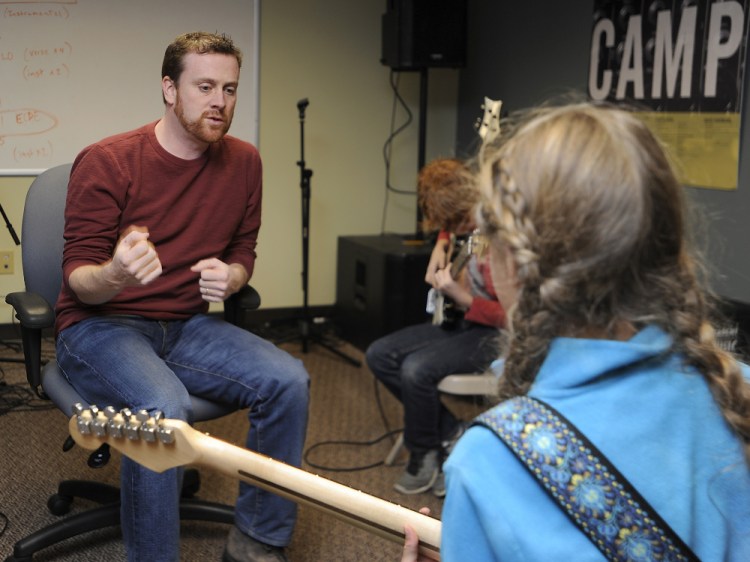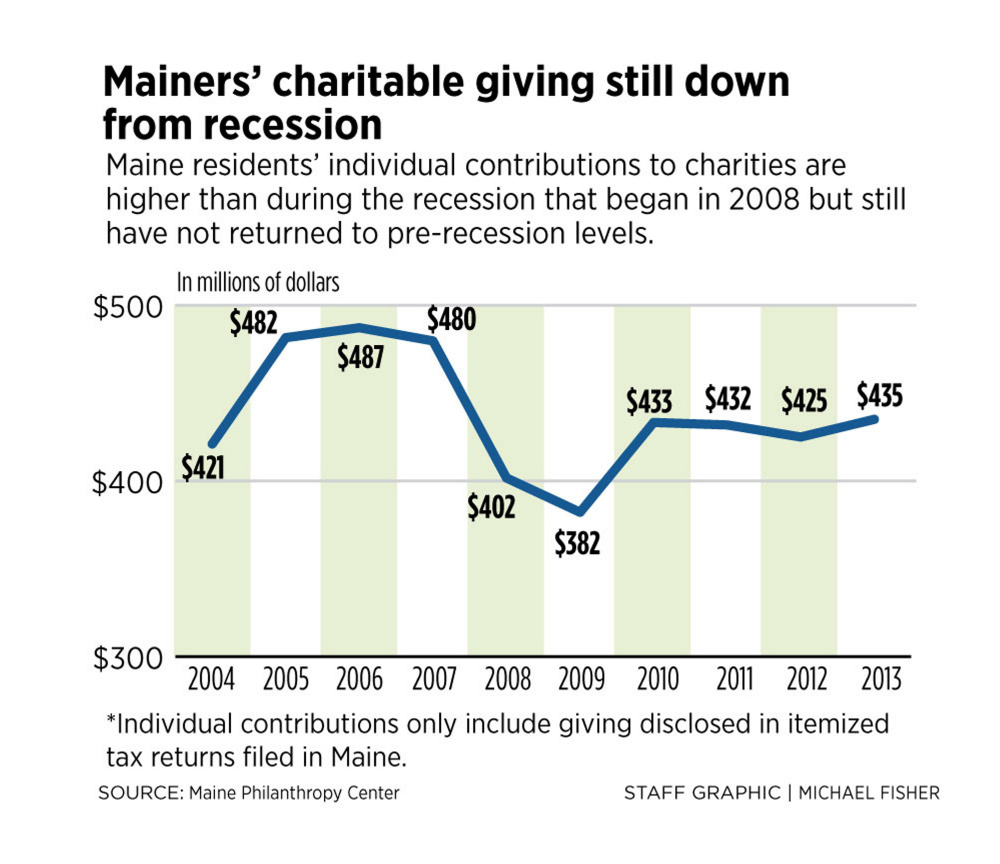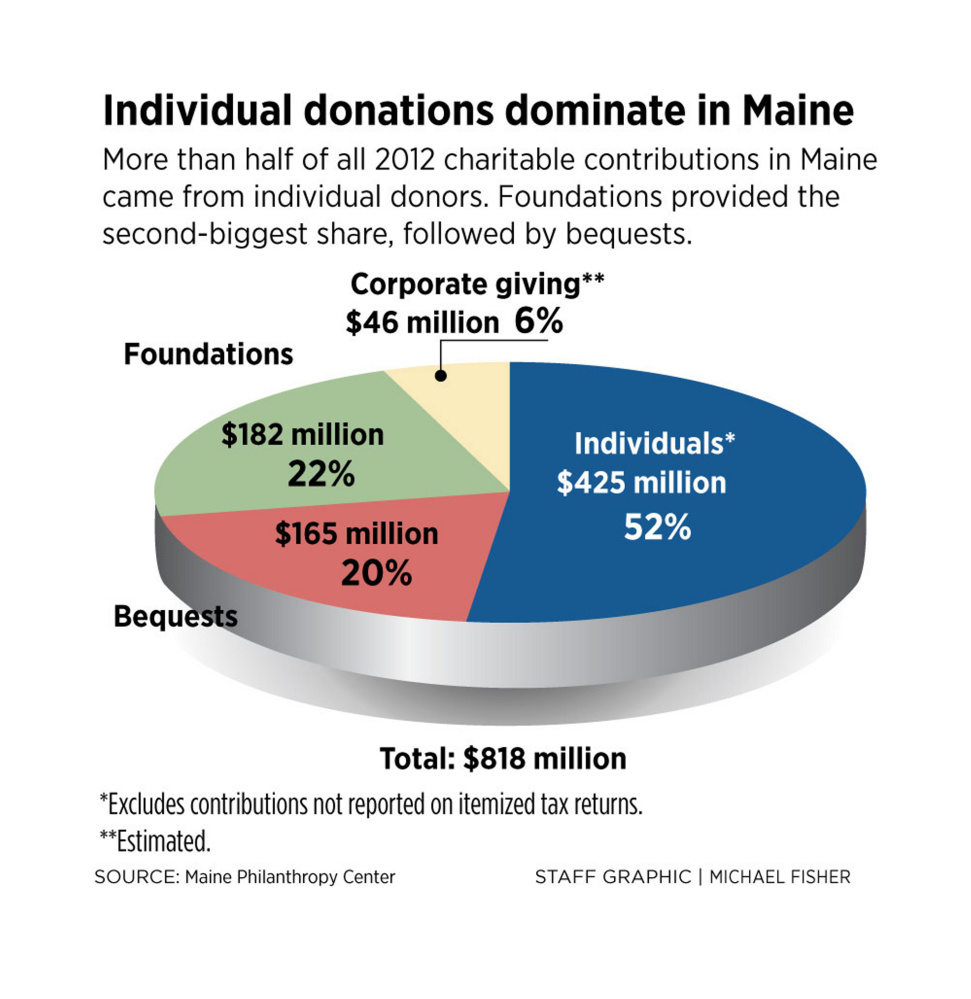The past several years have been rough on nonprofit organizations in Maine, which continues to lag behind the nation in charitable contributions by individuals.
Still, a recovery in individual giving was underway in the state as of 2013, the most recent year for which statistics are available. But while giving nationwide surpassed pre-recession levels in 2012 on its way to a record high, nonprofits in Maine continued to feel the effects of a depressed economy.
Maine continues to rank near the top among states with the greatest number of nonprofits per capita, but the total number of organizations is on the decline. While the number of public charities in the state increased by about 17 percent from 2003 to 2013, the number of private foundations and other nonprofits declined by 22 percent, according to the National Center for Charitable Statistics. Civic leagues and social welfare organizations declined by 32 percent over the 10-year period, and private, grant-making foundations fell by 16 percent, the center said.
To survive in Maine, nonprofit organizations must be well-managed, develop diverse income sources and maintain a sharp focus on their respective missions, said Scott Schnapp, executive director of the Maine Association of Nonprofits.
“The resources to support a big nonprofit sector have never really been there,” he said, adding that many Maine nonprofits have shut down or consolidated in recent years. “I think the recession just kind of accelerated that to some degree, or just kind of shocked the system.”
The nonprofit sector remains a vital part of Maine’s economy, employing one in seven workers, paying roughly $3.6 billion in annual wages and contributing about $10 billion a year to the state’s economy, according to the most recent Association of Nonprofits data.
Individual giving to charities in Maine reached a pre-recession high of $487.2 million in 2006, according to the Maine Philanthropy Center in Portland. That figure is based on the total amount of contributions disclosed on Mainers’ itemized tax returns, so it does not capture all giving.
Then itemized giving started to decline, falling as low as $382.1 million in 2009. It has recovered significantly since then, but the 2013 total of $435 million is still down more than 10 percent from 2006.
That doesn’t mean it is impossible for nonprofit organizations in Maine to succeed – even new ones.
Jeff Shaw picked perhaps the worst year possible in decades to start a nonprofit music school in Portland. Shaw, founder and executive director of the Maine Academy of Modern Music, knew he was facing a challenge when he opened the school in 2007.
Shaw said he considered making the academy a for-profit institution, but ultimately decided that a nonprofit model was the best fit for his mission to make music lessons more accessible to kids.
“It just felt morally like the right move,” he said. “Making money off of kids just seemed wrong to me.”
After a few years of relying more heavily on tuition fees while the academy established its track record, Shaw said the school has been able to procure grant funding since then, and in 2014 taught lessons to about 750 children of all income levels throughout the state.
“The margins are razor thin, but we make it work,” he said.
HEALTHY SUPPORT FOR FOUNDATIONS
One bright spot in Maine’s nonprofit sector has been foundation giving, according to Philanthropy Center analyst Christina Foster. Foundations in Maine have grown by double the national average in terms of both the total asset base and dollars given since the recession, she said. Foundation giving doubled to $181.8 million during the 10-year period from 2002 to 2012, although it was only $137.7 million in 2013, the most recent year for which numbers are available.
“While philanthropic giving is a small piece of the overall charitable giving to nonprofits, Maine has seen a significant increase in the recent past,” Foster said. “Our foundations are still small in comparison to the rest of the nation, but the base has grown at a much higher rate than the nation.”
Bequests – charitable donations that people leave in their wills – rise and fall dramatically from year to year but generally are higher per capita in Maine than in most other states, Foster said. Total charitable giving in Maine reached a high of $960.8 million in 2010, thanks to $338 million in bequeathed contributions, more than three times the average yearly amount over the past decade, according to the Philanthropy Center. In 2012, the most recent year for which numbers are available, total giving in Maine was $818 million, including $165 million in bequests.
MEASURES OF MAINERS’ GENEROSITY
Maine consistently ranks near the bottom in terms of the percentage of income given to charities. In 2012, the state was No. 48 among the 50 states and the District of Columbia with about 2.1 percent of income going to charities, according to a geographic study by the Chronicle of Philanthropy.
The highest percentage of income in Maine (5.2 percent) was donated by those earning $25,000 or less, while the lowest percentage (1.8 percent) was donated by those earning between $100,000 and $200,000 a year, according to the study.
One reason that Maine consistently ranks so low in giving-per-dollar-earned is the state’s relatively low church attendance, it said. Top-ranked states included those in the Bible Belt of the Southeast, and the No.1-ranked state in 2012 was the Mormon stronghold of Utah. According to The Giving Institute’s 2015 Giving USA report, about 32 percent of all giving nationwide went to religious organizations in 2014.
Overall giving totals don’t affect individual charities as much as one might assume, because every charitable organization is unique, said Schnapp, of the Maine Association of Nonprofits. Well-run charities with the ability to demonstrate a clear benefit to the community generally do just fine in Maine, he said.
Still, Schnapp said Mainers should never take charitable organizations for granted, because they contribute heavily to the state’s quality of life.
“The sector is extremely dependent on the generosity of those who value the work that they do,” he said.
Send questions/comments to the editors.






Success. Please wait for the page to reload. If the page does not reload within 5 seconds, please refresh the page.
Enter your email and password to access comments.
Hi, to comment on stories you must . This profile is in addition to your subscription and website login.
Already have a commenting profile? .
Invalid username/password.
Please check your email to confirm and complete your registration.
Only subscribers are eligible to post comments. Please subscribe or login first for digital access. Here’s why.
Use the form below to reset your password. When you've submitted your account email, we will send an email with a reset code.